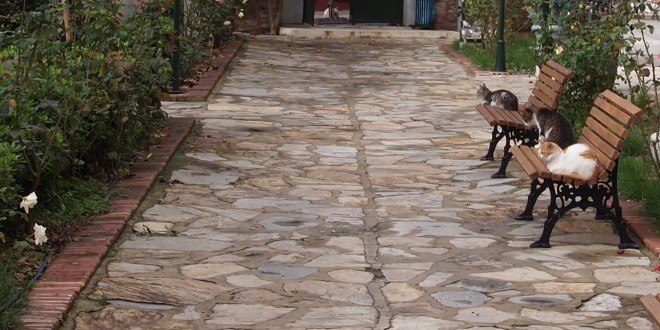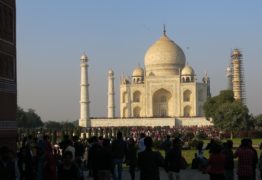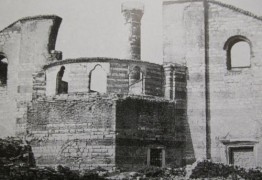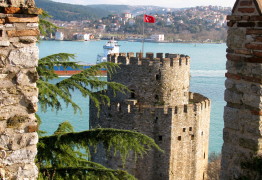It was almost 2010. Sankar would start his job in Istanbul in March, and I planned to join him in June. We had work to do. We needed to begin building our life in Turkey. Or at least creating a pathway toward it.
I tried to recall everything I’d ever learned or heard about Turkey. It wasn’t much. In fact I came up with just four facts. First, Turkey was the “Ottoman” in Ottoman Empire. Second, it was a member of NATO. Third, it wasn’t close friends with its neighbor, Greece (That from reading Louis de Berniers’ book, Birds Without Wings for my book group. The two countries had actually had a bitter population exchange in the 1920s). Last, I knew Turkey had had a leader named Atatürk. What was up with that name? Did the man’s name and the country’s name have anything to do with each other?
I didn’t quite know where Greece was in relation to Turkey. My neighbor declared it was to Turkey’s south. Later, checking a map, I discovered Greece lies west of Turkey.
In my mid-twenties, at the beginning of my year and a half tour in Yemen, I had met an American professor of Turkish history and his wife, Jan. When Jan mentioned they had lived for several years in Turkey. I voiced a common misperception.
“Turkey. That just seems like a dirty country.”
Jan fixed me with a rebuking stare. “It is very clean,” she said. Embarrassed, I fell silent. Later in life I would be highly critical of people who judged countries they had never visited.
Jan was probably used to hearing negative comments about Turkey. The movie, Midnight Express, had come out only a year earlier. Financed by Greece and directed by Oliver Stone, it portrayed horrors encountered in Turkish prisons by young Westerners caught smuggling drugs. The film frightened a generation of would-be travelers to Turkey.
I had never seen Midnight Express. In fact my present thoughts were not on a movie, but on a book that had nothing to do with Turkey per se. It was Culture Shock, A Wife’s Guide. Written by Robin Pascoe, an irreverent Canadian embassy wife, it asks the question, “In a marriage overseas, what else is there besides guilt and resentment?” Pascoe writes that the expatriate husband feels guilty for dragging his wife overseas, and the wife resents her husband for the same. Pascoe also confides that she “places feelings of isolation highest on my list of emotions that feed my antagonism toward my husband.” I felt like Pascoe had been watching me in Costa Rica.
In Costa Rica it had been easy to blame Sankar when things went wrong, and he had taken it without comment, the price he had to pay for his plum job. It had felt good to have this power while I felt otherwise powerless. And blaming my hubby for feeling lonely? I had been a master of that.
Talking Turkey
After Christmas, Sankar contacted a colleague who had recently returned from working in Istanbul. He and his wife agreed to meet us for dinner.
Our most pressing question was about housing, but I hoped this duo would also share some specific things we should either make sure to do, or make certain not to do for fear of offending Turks. Cultural do’s and don’t’s.
We had met with Sankar’s immediate predecessor and his family before going to Costa Rica. A large Chilean family, they had provided well-meaning tips but, already fluent in Spanish and with a special-needs child, their perspective was different from ours. That only became apparent until many months and several big decisions later. It was better, I learned, to seek advice from one’s own countrymen.
Mark and Beth, a handsome American couple in their early forties, met us just after Christmas at an Italian restaurant in St. Paul. Attempting a gracious start to our adventure while at the same time realizing I might be overdoing it, I presented them a thank-you box of Godiva chocolates.
The pair told us they had enjoyed Istanbul, but had chosen to live far north of the city, close to the International School their four children attended. Beth seemed reserved, but Mark rattled off the names of several attractive neighborhoods closer in, and I jotted them down in a notebook. He told me that my knowledge of Arabic would be helpful, but warned that Turks would be insulted if we referred to them as Arabs. He also cautioned against ever–ever–criticizing the founder of the Turkish Republic, Mustafa Kemal Atatürk. There was that name again, Atatürk. Apparently his memory was sacrosanct.
As our dinners were placed in front of us, I confided to Beth that I was worried about being lonely in Istanbul. I told her I had been alone much of the time in Costa Rica, with little to do. Beth brightened and became more talkative. She had a chemistry degree, she told me, and had found work as a volunteer science teacher at what she said was a “secret” evangelical Christian school. Overhearing that, Mark interrupted her and said no, it wasn’t a secret; the Turkish government was aware of the school. Beth shook her head in disagreement.
“Anyhow, you should go there and meet them. They would take you right in,” she enthused. Apparently it had been a lifesaver for her.
I wasn’t inclined toward conservative Christianity, but this was startling. In Yemen, proselytizing for any religion other than Islam had been strictly forbidden, and I shocked that anyone would attempt such a thing in a Muslim country. I was taken aback that Beth had brought up the topic. But then I had asked her for help.
As Sankar and I drove away after dinner, I had to fight the impulse to disparage Beth. The old me would have exclaimed, “Can you believe what she did in Istanbul?” as soon as we got into the car. Sankar would have listened, his mouth tight, thinking, Sue has already found something to dislike.
My dad had a habit of adding an admonition to every plan (“Sure, drive to Chicago, but you’re probably going to get stuck in traffic on the way.) While I knew he did so because he cared, it made him seem negative. I hadn’t intended to follow in his footsteps, but now I realized I was close to doing just that. Instead of throwing up roadblocks ahead of time, I criticized after the fact, as a way of presenting myself as discerning, letting people know I “didn’t miss a thing.” Now I began to realize how negative that also sounded, how it could cast a pall—or even direct blame.
Now, with some effort, and a feeling that I was leaving something important unsaid, I simply murmured something about what a nice evening it had been, and then rode home quietly. Before long, my frustration gave way to a sense of pride. Being gracious about the evening hadn’t been all that difficult. But would I be able to replicate this later, when deep in culture shock?
Our Friends Fear for Us
As the New Year approached, I told friends and neighbors about our plans. They seemed to bifurcate into two distinct groups: “We’re coming to see you!” and “Aren’t you afraid to go there?” All, however, were helpful, taking me out for goodbye lunches and dinners and listening to my concerns. I received several going- away gifts, mostly books. One was a slim, but substantial hardcover book called Eyewitness Travel Turkey. The cover photo featured a lapis lazuli body of water and a rugged-looking island with a sailboat lazing alongside it. Beneath was a summary of the attractions described inside the book: “bazaars, restaurants, beaches, mosques, history, carpets, hotels, national parks, shops, museums, ruins.” I sat down on my usual section of the couch and, snow flying outside, leafed through Eyewitness Travel Turkey.
Lavishly illustrated, the book divided Turkey into regions, including Thrace, the Aegean, the Mediterranean, and the Black Sea. As I paged through the book, words I’d known all my life, but never quite understood caught my eye. Byzantium. Caravansaray. Golden Horn. Topkapi (wasn’t that a movie back in the 1960s?) The Bosphorus (when had I first heard this word and what, exactly, did it refer to?)
Our Childhoods Started There
The country was unfolding. I gazed at photos of ruined castles, Roman arches, and round domes topped with golden crescent moons. Pictures of embroidered textiles and gilded mosaics leapt out, as did names of characters that had populated the fairy tales I’d read eons ago. Aladdin. King Midas. King Croesus. St. Nicholas.
I read about a church called the Hagia Sofia whose title meant holy wisdom. It was apparently a “vast edifice” that had stood in Istanbul since the 300s AD. And—this surprised me—it had been the largest church in the world for a thousand years.
The largest church for a millennium? How had I never heard about this place? I was still ambivalent about moving, but I couldn’t resist asking Sankar about it. He had grown up in India and had studied world history, something my high school hadn’t required. “How was a building in Turkey the largest church for so long?” I asked as we sat down to supper one evening.
“Well,” he replied, pleased at my interest. “When Rome fell, the empire and the control of Christianity moved east, to what is now Turkey. It was called the Eastern Roman Empire. Constantine ruled the city, and he named it after himself. He was the first emperor to convert to Christianity, so he built some important churches.
Like everyone, I knew the Roman Empire had fallen. But I had no idea what had happened after that. I had no idea that a city in now-Muslim Turkey had been the caretaker of my own religion.
Was it possible Turkey had something to teach me? And might living there help stitch together some of the facts that had free-floated in my head since childhood? I began to picture myself as a kind of scholar sitting alone (somehow this kind of loneliness did not seem unappealing) in a courtyard shaded by plane trees. Men wearing turbans and women in black robes passed by. My head was bent over an old book, its pages brittle and yellowed. I was beginning to sense the depth of Turkish history—and that I might enjoy uncovering it.
Still, some days I felt only dread. True, there would be a great deal to see and discover. But inevitably there would also be loneliness and incomprehensible situations. It would be so easy to react negatively.
I could only hope that gearing up intellectually would help me dodge resentment. That my curiosity might drag us out of the expatriate wife’s ruts of guilt and resentment.
I’d only taken a small step toward changing my attitude, but my success gave me hope I could manage bigger steps. And Eyewitness Travel Turkey? It had taken up residence on my kitchen table. I read a new section every day.



